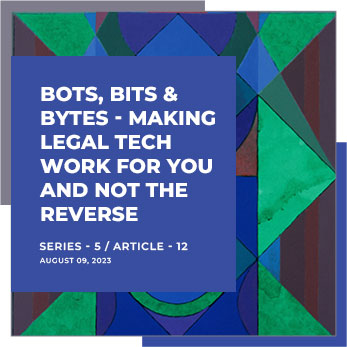“Anyone that has worked a day at a law firm or at a set of chambers will have encountered a windowless room filled with nothing but hundreds upon hundreds of folders bursting at the seams with legal documents likely never to be read again.”
Is your law firm going through a couple of hundred legal pads or more per year? Are you still printing out routine emails? Are your printers left running all night while the office is closed? If you answered ‘yes’ to any of the above, then you and your partners have some work to do to get your office ‘green’! Workplace sustainability has been evolving for more than a decade, and the law office workplace is no exception.
From the adaptation of new, low-energy consumption technology to making recycling a policy and a practice, there is a lot that law firms can do to help improve the environment. We will take a look at some of the eco-friendly ‘habits’ that your firm can easily adopt.
Going Green and Saving Green
Aside from the environmental responsibility aspect of creating an eco-friendly law office, there is the added benefit of your firm saving money. An American Bar Association guide, ‘Law Office Guide to Energy Efficiency’ disclosed that energy expense typically represents 30% of a building’s operating costs and therefore constitutes the single most controllable expense. When looking for new office space, one of your considerations should be whether it has LEED certification.
The Green Building Council has developed the ‘Leadership in Energy and Environmental Design’ (LEED) rating system, which is the most widely used green building rating system in the world. A LEED credential denotes proficiency in sustainable design, construction and operations standards. Although there are different levels of LEED ratings, LEED for Operations and Maintenance offers even existing buildings the opportunity to become LEED efficient.
Kitchenette Considerations
A survey of your office’s consumable products might very well reveal that your office is high on the use of plastic disposables, for which there might be an alternative. If staff regularly take one gulp from a plastic cup at the water cooler and throw it away, such waste can quickly add up to a big expense—and an even bigger landfill. Consider switching to paper cups which degrade much more rapidly. The same applies to disposable coffee cups, which, although they are most likely made out of eco-friendly cardboard, this single-use bit of kitchenware can also be eliminated altogether by having employees bring their own ceramic or glass coffee cups and by supplying the same for visiting clients in your firm’s kitchenette.
Monitoring Office Supplies
Using printer paper, stationary, and other paper goods is inevitable. However, an increasing number of office supply houses offer recycled paper goods. By verifying that your office is stocked with recyclables, your firm can do its part to positively affect this aspect of environmental concern. And by having the ‘recycled’ symbol on your letterhead, your firm can further promote itself as being a sustainability-conscious organization.
It is not just your office consumables that can take advantage of recycling, but also outdated forms, long-closed-out paper files, and similar paper waste, which should always be sent to a shredder/recycler (many of whom have regularly scheduled visits to office buildings) rather than shredded and dumped in the trash where they will only add to the problem of overfilled landfills. Although ‘going paperless’ is a stated goal of many organizations, this is particularly hard for law firms even in the age of paperless filings. However, LexisNexis has developed a guide for instructing law firms as to how they can make significant strides in that direction.
Eco-friendly Office Furniture
When you furnish your office, pay attention to which manufacturers and vendors offer furniture that has at least some component of recycled materials. It is increasingly common to find such a notation on the tag regarding fabrics, and this should be a purchasing policy of your firm when undertaking any remodeling and refurnishing projects.
Green Office Technology
Much of today’s office equipment has powering-down features to reduce energy consumption when the device is not in use. However, that is deemed the minimum that a firm can do regarding energy-efficient office equipment. When replacing monitors, laptops, and printers, the energy ratings of such items should be a part of the purchasing decision. And it is not just office equipment but other accessories that can contribute to energy waste. An Appliance Standards Awareness Project study found that the average microwave is only used about 70 hours a year, yet while unused, it may still consume as many as 35-kilowatt hours in one year. Everything from microwaves to coffee machines to refrigerators and water dispensers should be evaluated in terms of energy efficiency before buying. In addition, even many older appliances can be fitted with Smart Power Strips to control after-hours electricity consumption.
An Office ‘Green Czar’
When it comes to changing wasteful habits, changing human behavior is one of the most difficult obstacles to overcome. Rather than expecting everyone in the office to simply understand the issue and change his or her ways, by making sustainability an office-wide policy complete with a list of dos and don’ts, the endeavor becomes less of an individual burden and more of a participatory team effort. In fact, by soliciting ideas from the office staff, the effort can even come to have a rather positive, competitive element.
However, over time, even the most well-intentioned habit changes tend to get shoved aside, especially when there are deadlines to meet and an overall frantic schedule. Then, such things as making sure the lights are off in an unused room or making sure to walk old papers over to the shredder in the store room become quite secondary to the perceived function of a law office. By having a point person in charge of your sustainability policy, your firm’s progress towards environmental responsibility can be greatly improved.
And at the end of the day, your firm’s commitment to going green will, at the same time, add quite a bit of green to your firm’s bottom line.
Executive Summary
The Issue
How to create a ‘green’ law office?
The Gravamen
Numerous opportunities exist for your firm to become eco-friendly, from building selection to choice of supplies, maximizing recycling, and upgrading to eco-friendly technology.
The Path Forward
By adopting sustainability policies and enforcing them, your firm can do its part to maintain a green office.
Action Items
LEED Certification:
One of your first considerations should be what type of office building will your firm be housed in?
Retrofitting Space:
Whether your firm purchases an older building for rehabilitation or your landlord allows a build-out allowance, everything from energy-efficient windows to LED lighting should be a part of your space’s sustainability plans.
Waste Management:
Whether by way of purchasing degradable consumables or properly disposing of consumables already spent, your firm should adopt a policy on waste management as part of its environmental responsibility.
Invest in Upgraded Technology:
An array of office tech innovations exist that put energy efficiency right up there with functionality, and this should be a significant factor in choosing office technology.
Further Readings
- https://zegal.com/blog/post/is-legal-tech-making-the-legal-industry-greener/
- https://greenbusinessbureau.com/industries/law/law-firm-sustainability/
- https://realautomators.com/hotdocs/make-law-firm-eco-friendly/
- https://www.legaleaseconsulting.com/legal_ease_blog/2008/07/the-green-law-f.html
- https://usgreentechnology.com/go-green-law-firms/







